Author: adminEJ
(Português) Elisabete Jacinto participa em co-drive em Marrocos
Elisabete Jacinto rises to the podium in Morocco
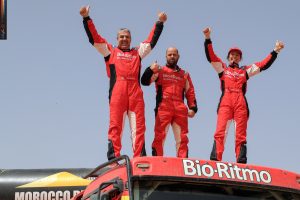 Elisabete Jacinto rose to the third place of the podium of the truck competition of the Morocco Desert Challenge. The Bio-Ritmo® team achieved the goals set for this race after finishing the seventh and final round of this African marathon, where they finished in the fourth place of their class. The Portuguese took 1h19m52s to complete the 138 timed kilometers that composed the stage that was held between Tendrara and Oujda and finished the special with a difference of 5m25s for the Dutchman Martin Van Den Brink, the winner of the truck category of this event. In addition to the three trucks, only two cars were faster than Elisabete Jacinto in today’s stage.
Elisabete Jacinto rose to the third place of the podium of the truck competition of the Morocco Desert Challenge. The Bio-Ritmo® team achieved the goals set for this race after finishing the seventh and final round of this African marathon, where they finished in the fourth place of their class. The Portuguese took 1h19m52s to complete the 138 timed kilometers that composed the stage that was held between Tendrara and Oujda and finished the special with a difference of 5m25s for the Dutchman Martin Van Den Brink, the winner of the truck category of this event. In addition to the three trucks, only two cars were faster than Elisabete Jacinto in today’s stage.
The Portuguese trio composed by Elisabete Jacinto, José Marques and Marco Cochinho made the whole rally without problems and managed to win two (the first and the penultimate) of the seven stages of this event. In fact, the Portuguese team remained from the first day of competition in the summit positions among the T4 which allowed them to maintain the third place in the overall classification of their class, place obtained at the end of the second day of the race.
The selective sector of this final special was shortened because the bad weather that has been felt in recent days has left some areas unable of being transposed. Thus, for security reasons the organization of the race has chosen to cancel the last 40 kilometers of the stage. Still, Elisabete Jacinto made a positive evaluation of this journey and was very pleased with the result achieved:
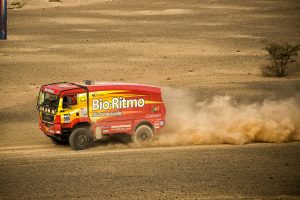 “today’s special was a little shorter. During the night fell hail and it rained and there were parts with oueds that were full of water and it was impossible to pass. So the organization decided to cut the last kilometers so that there were no problems. The selective sector went well for us. We were the second vehicle to go to the stage and we made the whole special always accelerating. We came a little bit behind the Renault of the 505 team, but at a certain point they stopped with a problem and we moved on and we were the second truck to arrive at the camp. This race went quite well. The balance couldn’t be more positive. We had no trouble throughout and we are very pleased with our result. We already needed a race like this”, said Elisabete Jacinto at the end of the stage.
“today’s special was a little shorter. During the night fell hail and it rained and there were parts with oueds that were full of water and it was impossible to pass. So the organization decided to cut the last kilometers so that there were no problems. The selective sector went well for us. We were the second vehicle to go to the stage and we made the whole special always accelerating. We came a little bit behind the Renault of the 505 team, but at a certain point they stopped with a problem and we moved on and we were the second truck to arrive at the camp. This race went quite well. The balance couldn’t be more positive. We had no trouble throughout and we are very pleased with our result. We already needed a race like this”, said Elisabete Jacinto at the end of the stage.
The Bio-Ritmo® team will return to the competitions in October when it will take place the Rally Oilibya du Maroc 2017.
Elisabete Jacinto wins sixth stage
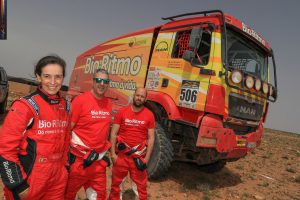 Elisabete Jacinto won the sixth and penultimate stage of the Morocco Desert Challenge that took place today between Merzouga and Tendrara. The Bio-Ritmo® team was the fastest among the T4s to perform this special composed by 405 timed kilometers, the longest in this competition, and they took 5h53m11s to complete the entire selective sector. The Portuguese finished with a nine-minute lead to the Dutchman Martin Van Den Brink, the current leader of the truck class, and only one car managed to be faster than Elisabete Jacinto to complete today’s course including in this role the motorcycle competition.
Elisabete Jacinto won the sixth and penultimate stage of the Morocco Desert Challenge that took place today between Merzouga and Tendrara. The Bio-Ritmo® team was the fastest among the T4s to perform this special composed by 405 timed kilometers, the longest in this competition, and they took 5h53m11s to complete the entire selective sector. The Portuguese finished with a nine-minute lead to the Dutchman Martin Van Den Brink, the current leader of the truck class, and only one car managed to be faster than Elisabete Jacinto to complete today’s course including in this role the motorcycle competition.
The Portuguese formation, composed by Elisabete Jacinto, José Marques and Marco Cochinho, thus strengthened their overall position and they keep the third place in the truck category with a solid advantage of more than four hours for the Belgian Igor Bouwens who, at the wheel of an IVECO, is currently fourth in their class.
Elisabete Jacinto, who added her second stage victory on this rally, was the fastest driver among the Portuguese in the race and made a positive assessment of the day:
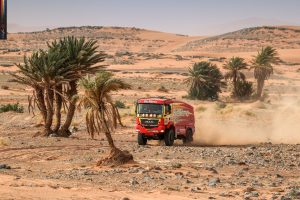 “It was a very beautiful stage on the Moroccan plateaus. Today the tracks were smooth and once it didn’t have many holes and ditches we were able to walk quite fast. Today we left in the fifth place and we were able to accelerate as much as possible until we started catching the trucks that departed in front of us. The navigation was complicated, but the Zé Marques never made a mistake and we came straight to the end. It was a great day. We are very happy with this victory”, said Elisabete Jacinto at the end of the special.
“It was a very beautiful stage on the Moroccan plateaus. Today the tracks were smooth and once it didn’t have many holes and ditches we were able to walk quite fast. Today we left in the fifth place and we were able to accelerate as much as possible until we started catching the trucks that departed in front of us. The navigation was complicated, but the Zé Marques never made a mistake and we came straight to the end. It was a great day. We are very happy with this victory”, said Elisabete Jacinto at the end of the special.
This edition of Morocco Desert Challenge is coming to an end. The seventh and final stage of this African race will be disputed tomorrow between Tendrara and Oujda and will be composed of 178 timed kilometers. This special will be shorter, but it won’t be easier. There will be a wide variety of routes that will alternate between fast tracks where competitors can accelerate without any risk and slower paths with lots of rock, holes and deep ditches. It will be a special that will require total concentration and a perfect navigation.
Elisabete Jacinto keeps podium place among trucks
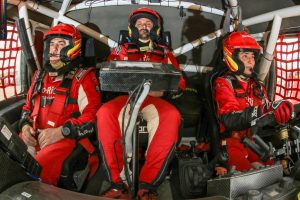 Elisabete Jacinto reinforced today the third place of the general classification of the trucks, position reached on the second day of the race, now that five of the seven stages that compose the Morocco Desert Challenge were disputed. The Bio-Ritmo® team now has an advantage of around 1h30m for Belgian Igor Bouwens, who is fourth in the overall of the T4 class, at a moment where there are only two stages of this great African marathon left to dispute. The Portuguese are thus closer to achieving the goals set at the start of this race.
Elisabete Jacinto reinforced today the third place of the general classification of the trucks, position reached on the second day of the race, now that five of the seven stages that compose the Morocco Desert Challenge were disputed. The Bio-Ritmo® team now has an advantage of around 1h30m for Belgian Igor Bouwens, who is fourth in the overall of the T4 class, at a moment where there are only two stages of this great African marathon left to dispute. The Portuguese are thus closer to achieving the goals set at the start of this race.
The trio composed by Elisabete Jacinto, José Marques and Marco Cochinho, took 4h18m09s to complete the whole course of the fifth day, which was fulfilled today around Merzouga, having spent more nine minutes than the third classified in the truck category. The Portuguese team ended the 213 timed kilometers in fifth place in their class.
Today’s special was shorter than expected because a strong sandstorm, that hit the Erfoud region, prevented the pilots from leaving early in the morning. Thus, the organization of the race chose to cancel the first 30 kilometers that would be made in Erg Chebbi. Despite the difficulties, inherent to the course and the climatic conditions in which the selective sector was held, the Portuguese performed the stage without any problem:
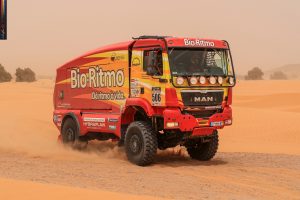 “there was a sandstorm all night and at the time of leaving for the special the storm was so strong that there were no conditions to start the race. Thus, the organization postponed the competitions and the first motorcycle only left at noon. For this reason the stage turned out to be a little shorter because the organization decided to cancel the initial part of the special and we ended up not making the crossing of Erg Chebbi. Still we made the dunes of the Ouzina and made some of the Chebbi before we arrived at the camp. It was a very beautiful stage, difficult and sinuous. Despite the setbacks it all went well with no problem to point out”, said the Portuguese driver Elisabete Jacinto.
“there was a sandstorm all night and at the time of leaving for the special the storm was so strong that there were no conditions to start the race. Thus, the organization postponed the competitions and the first motorcycle only left at noon. For this reason the stage turned out to be a little shorter because the organization decided to cancel the initial part of the special and we ended up not making the crossing of Erg Chebbi. Still we made the dunes of the Ouzina and made some of the Chebbi before we arrived at the camp. It was a very beautiful stage, difficult and sinuous. Despite the setbacks it all went well with no problem to point out”, said the Portuguese driver Elisabete Jacinto.
The sixth and penultimate stage of the Morocco Desert Challenge rally will be held tomorrow. This special, which will take place between Merzouga and Tendrara, will be the longest one of this great African marathon. It will be 405 timed kilometers that will alternate between fast tracks, plains and stony rails dotted with deep ditches and holes.
Elisabete Jacinto achieves second place and reinforces truck podium
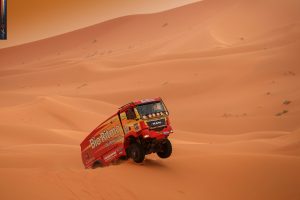 The Portuguese pilot Elisabete Jacinto finished the fourth stage of the Morocco Desert Challenge, a demanding journey with many sand passages and dunes, in second place in the truck category. The Bio-Ritmo® team took 4h40m31s to complete the 276 timed kilometers of the selective sector that was held between Oum Jrane and Merzouga.
The Portuguese pilot Elisabete Jacinto finished the fourth stage of the Morocco Desert Challenge, a demanding journey with many sand passages and dunes, in second place in the truck category. The Bio-Ritmo® team took 4h40m31s to complete the 276 timed kilometers of the selective sector that was held between Oum Jrane and Merzouga.
The Portuguese trio formed by Elisabete Jacinto, José Marques and Marco Cochinho finished the stage that took place today with a difference of about 28 minutes for the Dutch Martin Van Den Brink who, at the command of a Renault, was the fastest among the T4 and is currently the leader of this category.
Elisabete Jacinto is now going to the fifth stage of this African marathon in third place in her class with a short difference of 13 minute for the second place, which is occupied by the Dutchman Gert Huzink, and with a comfortable advantage of about 50 minutes for the Belgian Igor Bouwens, who continues to occupy the fourth position among the trucks.
Although the course of this fourth stage imposed many difficulties, the Portuguese team managed to overcome all obstacles:
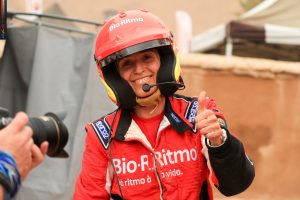 “today’s stage was very varied, but it was also very difficult. The first part of the sector was fast and we managed to do it quite well. The second part was slower. We crossed two Ergs, the Ouzina and the Chebbi. In the first one we caught some very high dunes, but we passed them without any complication. When we reached the Erg Chebbi we had to make about 20 kilometers of dunes that were truly difficult to overcome. For several times, we almost got upside down. One time I even thought we would roll forward. The crests of the dunes were very high and the rear seemed to want to jump forward. But fortunately it went well and we are proud of the work we did today, “revealed Elisabete Jacinto on arrival in Merzouga.
“today’s stage was very varied, but it was also very difficult. The first part of the sector was fast and we managed to do it quite well. The second part was slower. We crossed two Ergs, the Ouzina and the Chebbi. In the first one we caught some very high dunes, but we passed them without any complication. When we reached the Erg Chebbi we had to make about 20 kilometers of dunes that were truly difficult to overcome. For several times, we almost got upside down. One time I even thought we would roll forward. The crests of the dunes were very high and the rear seemed to want to jump forward. But fortunately it went well and we are proud of the work we did today, “revealed Elisabete Jacinto on arrival in Merzouga.
The Morocco Desert Challenge is set to dispute its fifth round tomorrow in Merzouga. Once again the Erg Chebbi dunes will be part of the menu of a day where sand and dunes will be the main key words. The stage will count with 215 timed kilometers starting and arriving at the camp that is situated near the Moroccan city of Merzouga.
Elisabete Jacinto in third place among trucks
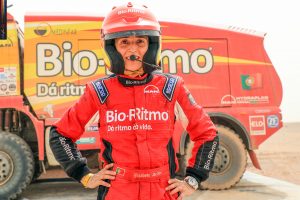 Elisabete Jacinto conquered today the third place among the trucks at the end of the third stage of the Morocco Desert Challenge. The Portuguese took 5h46m35s to complete the 347 timed kilometers that made up the special that linked Foum Zguid to Oum Jrane. After three days of competition, Elisabete appears in the third position of the general table of her category registering a 40-minute lead over Igor Bouwens who, at the wheels of an IVECO, is currently the fourth among the T4.
Elisabete Jacinto conquered today the third place among the trucks at the end of the third stage of the Morocco Desert Challenge. The Portuguese took 5h46m35s to complete the 347 timed kilometers that made up the special that linked Foum Zguid to Oum Jrane. After three days of competition, Elisabete appears in the third position of the general table of her category registering a 40-minute lead over Igor Bouwens who, at the wheels of an IVECO, is currently the fourth among the T4.
On a journey marked by many dunes, mainly the ones of the Erg Chegaga, the Bio-Ritmo® team managed to overcome all the obstacles imposed by this complex stage where sand predominated and only four cars, including two buggies and one SSV, were faster than Elisabete Jacinto:
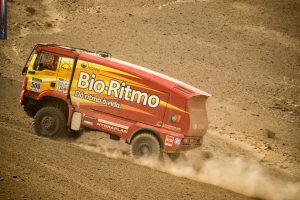 “it went well. Even though we have passed the dunes very slowly, we didn’t have to dig or get stuck in the sand, which for us is very positive. As soon as we stepped out of the sand we accelerated and fought to go fast. We managed to finish among the first which is very good” said the pilot on the arrival at the camp that is situated in Oum Jrane.
“it went well. Even though we have passed the dunes very slowly, we didn’t have to dig or get stuck in the sand, which for us is very positive. As soon as we stepped out of the sand we accelerated and fought to go fast. We managed to finish among the first which is very good” said the pilot on the arrival at the camp that is situated in Oum Jrane.
Tomorrow the Morocco Desert Challenge enters in its fourth day of competition. The journey will once again be marked by dunes and lots of sand. The caravan of this rally will cross tomorrow the magnificent Erg Chebbi dunes. The 276 timed kilometers of this fourth stage will start at Oum Jrane and ends at Merzouga.
Elisabete Jacinto is in second in the overall truck classification
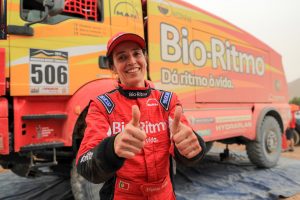 Elisabete Jacinto achieved at the second stage of the Morocco Desert Challenge rally, which took place today between Icht and Foum Zguid, the fourth place among trucks. The Portuguese move forward in the competition in second place in the overall classification of their category with a lead of 14 minutes for the third place, the Dutchman Gert Huzink who already won this same race in 2015.
Elisabete Jacinto achieved at the second stage of the Morocco Desert Challenge rally, which took place today between Icht and Foum Zguid, the fourth place among trucks. The Portuguese move forward in the competition in second place in the overall classification of their category with a lead of 14 minutes for the third place, the Dutchman Gert Huzink who already won this same race in 2015.
In this stage, made up of 359 timed kilometers, the fast tracks were very favorable to the most powerful vehicles. Still, the Bio-Ritmo® team formed by Elisabete Jacinto, José Marques and Marco Cochinho, spent 5:01:00 to complete the selective sector, finishing with a 15-minute difference for Belgian Igor Bouwens who, at the commands of an IVECO, ended in the third place of this stage. The Portuguese team was also nine minutes faster than the sixth pilot of the car category, position occupied by the Frenchman Michel Visy, who completed the special in 5:10:25.
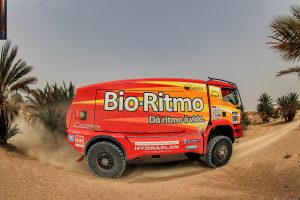 Elisabete Jacinto and her team completed another stage without problems:
Elisabete Jacinto and her team completed another stage without problems:
“This stage was very different compared to yesterday. We’ve walked on very fast tracks and full speed ahead. Because the other trucks are more powerful than ours they have quickly overtaken us. However, this position is somewhat comfortable because tomorrow we will enter the dunes and it is good to have other trucks in front of us so we can go on their tracks. We did the whole stage without problems and it went well “, revealed the Portuguese driver.
For the third stage of the Morocco Desert Challenge, which will be held tomorrow between the Moroccan cities of Foum Zguid and Oum Jrane, is reserved a day with a wide variety of tracks that will alternate between fast and technical routes and slower paths with many stones and deep holes. The navigation will be, once again, complex. It will be in the crossing of the Lac Iriki and in the passages by the immense dunes of the Erg Chegaga that will appear the greater difficulties of this special composed by 345 timed kilometers.
Elisabete Jacinto wins first stage
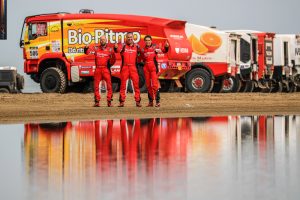 The Portuguese driver Elisabete Jacinto started today her participation in the Morocco Desert Challenge with a victory among trucks. The first stage of this great African competition, held between Agadir and Icht, was particularly hard. The 387 timed kilometers that composed this special were made in irregular soils, with a lot of stone and narrow tracks that made difficult the progression of the teams in the field.
The Portuguese driver Elisabete Jacinto started today her participation in the Morocco Desert Challenge with a victory among trucks. The first stage of this great African competition, held between Agadir and Icht, was particularly hard. The 387 timed kilometers that composed this special were made in irregular soils, with a lot of stone and narrow tracks that made difficult the progression of the teams in the field.
The Bio-Ritmo® team managed to finish this complex stage in 7h33m54s and managed to impose an eight-minute advantage to the second place of the category the Dutchman Paul Verheyden who, at the wheel of a DAF, spent 7h42m05s to perform the selective sector. For Elisabete Jacinto, although it was a tiring day, it was also very positive:
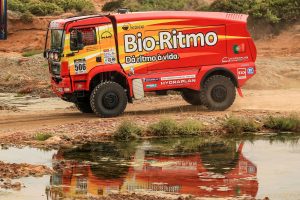 “It was a really difficult day. The tracks were very hard and were full of sharp stones that degraded our tires. We tried to go fast but it was difficult to make progress on this kind of floor. The navigation was very complex and required a lot of concentration on the part of our navigator José Marques. But, as always, he did an exemplary job and we were always on the right path. In addition to the difficulties inherent to the course we had to stop for three times to change the tires that, due to the bad tread, got flat and made us to lose some time. Adding to all this it was a very hot day. Our thermometer reached the mark of 41 degrees. But we are satisfied with the result above all because we have given our best” said Elisabete Jacinto.
“It was a really difficult day. The tracks were very hard and were full of sharp stones that degraded our tires. We tried to go fast but it was difficult to make progress on this kind of floor. The navigation was very complex and required a lot of concentration on the part of our navigator José Marques. But, as always, he did an exemplary job and we were always on the right path. In addition to the difficulties inherent to the course we had to stop for three times to change the tires that, due to the bad tread, got flat and made us to lose some time. Adding to all this it was a very hot day. Our thermometer reached the mark of 41 degrees. But we are satisfied with the result above all because we have given our best” said Elisabete Jacinto.
The second stage of this Morocco Desert Chalenge will be held tomorrow between Icht and Foum Zguid. The special will be composed of 359 timed kilometers fulfilled in zones with very fast tracks. But at the end of the stage competitors will have to cross a sandy oued and it will be necessary to take extra care not to get stuck in the soft sand.
TGS Cargo Box
Description of the new TGS cargo box built on 12/09/14
Aiming at lightning the MAN TGS competition truck from Team Oleoban, therefore making it easier to tread on sand, giving more competitiveness to the team, a new cargo box was built. It was designed by Engineer João Sabino and built at Carroçarias Sabino.
Keeping an innovative design, it was planned according to the following vectors for improvement:
- Weight reduction;
- Strengthening the chassis;
- Functionality;
- Aerodynamic performance.
To reduce the weight there was a selection of materials which are compatible with the sort of mission our vehicle is intended to, putting high resilience steel in places where there is higher structural effort and strain. To define the outside shape, the option was for light material based on structural aluminium and panels from composite materials.
The structuring part of the cargo box is particularly different from the previous version.
A conventional truck is designed to maximize its cargo hold, however our development team has been changing our TGS with the aim of turning it into a cross-country competition vehicle.
Instead of a conventional superstructure with the traditional over-chassis in the shape of a “Ladder”, made up of longitudinal frame bars, beams and structuring arches, a tubular latticed structure was designed. This new idea made it possible to completely let the traditional structure go and to substantially increase the twisting rigidity of the vehicle. Giving a general example, the ratio between this figure in a family vehicle and a competition vehicle is up to 25 times higher.
In general all the materials have a definite resilience capability which, in iron metal, is largely explored – the reason why it is considered excellent for manufacturing springs. However, this behavior may be considered disadvantageous, particularly for the work we have been doing for some time with APV – the firm which has been making the shock absorbers. Basically, by increasing the chassis rigidity, the free movements of the said chassis will be reduced, therefore delineating the operational limit of the sets of suspensions made up of springs and shock absorbers.
In what concerns functionality, the new box received a generously sized door on each side. All the equipment we need inside has been positioned in a way that makes it accessible from ground level but at the same time the centre of gravity from the whole is lowered and the weight of the components carried in the back is more concentrated.
At the back, cradles were built to fasten the spare tyres, so that it will be easy to remove them quickly. In turn, placing the tyres in that way influenced the shape of the rear door. However, this meant that the rear height could not be so significantly reduced by comparison with the previous cargo box.
Trusting the levels of reliability we have managed to obtain from our MAN, due to the excellent predictive and preventive maintenance work that has been done, the amount of spare parts carried inside the truck has been reduced, therefore diminishing its weight as well.
Of course inside we still carry some parts, tools, spare tyres and the always needed shovels, slabs to pull out of holes and hydraulic and pneumatic jacks.
At aerodynamic level, the idea was to reduce the parasitic resistance induced by the connection between the cabin and the cargo box and also by abrupt geometry change, a factor associated with undesired vortices (air swirls). As previously mentioned, the aim was also to lower the height at the back, giving the whole a more fusiform shape. However, functional restrictions limited the reduction to simply 150mm by comparison with the previous box, and now it has 350mm less height than the front. Given the good results obtained with the previous shape, the creation of a depression at the rear was raised, therefore reducing the wake created by the moving air. Though from a technical point of view all this may seem very complicated, in simple terms it means that less energy is transmitted to the air, less fuel is consumed or, putting it another way, the truck moves better on track, which is what one really expects from a competition truck!


